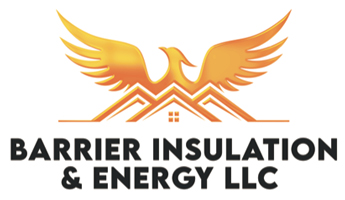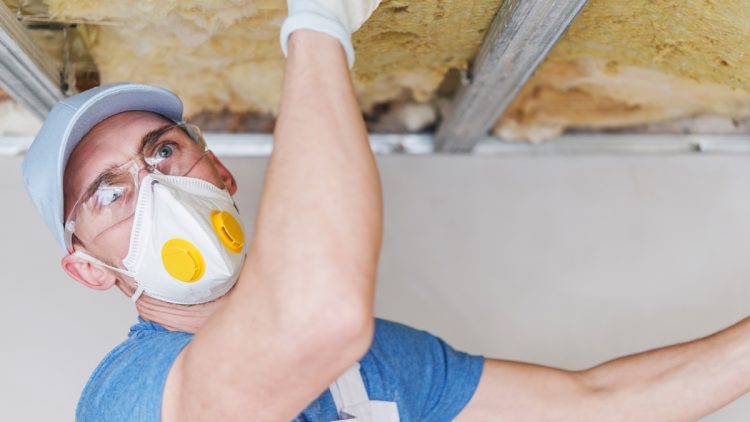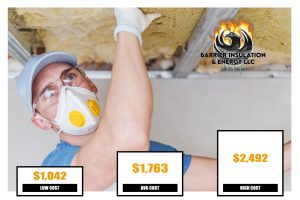Cost Of Batt Insulation
Typically, both batt and roll insulation cost an average of $1,763. Prices can range from $1,042-$2,492, according to HomeAdvisor. Home and business owners should expect to pay more than this depending on project location, the R-value and complexity of the installation.
- National Average Cost: $1,763.
- Cost Range: $1,042-$2,492.
- Low End To High End Cost: $490-$4,000.
Batt Insulation Cost Per Square Foot
Blanket insulation comes in two forms, rolls and batts and is made of flexible fibers, commonly referred too as fiberglass. Fiberglass is used in both batt and roll insulations. As the name would imply, tiny pieces of glass fiber are what the material is constructed from. Low-density insulation exists but high and medium quality density insulation options provide higher R-values. Fiberglass insulation also works great for areas when there is little space for insulation, for example, cathedral style ceilings.
Plastic, wool and organic fibers such as cotton are also made for blanket insulation. Homeowners purchase roll and batt insulation without or with facing and helps with air and moisture defense. Fire resistant features are also available with some types of batt insulation. R-3 to R-4 per inch is the most common R-value for batt and roll insulation.
While homeowners are likely to spend between $1-$3 per square foot, here’s a look at average costs per square foot:
- 100 sq. ft.: $100-$300.
- 300 sq. ft.: $300-$900.
- 500 sq. ft.: $500-$1,500.
- 700 sq. ft.: $700-$2,100.
- 1,000 sq. ft.: $1,000-$3,000.
- 1,500 sq. ft.: $1,500-$4,500.
- 2,000 sq. ft.: $2,000-$6,000.
- 2,500 sq. ft.: $2,500-$7,500.
Insulation Roll Cost
An insulation roll will run between $0.50-$1.70 per square foot. Prices fluctuate depending on the brand, thickness, material and R-value.
Batt And Roll Insulation Cost By R-Value
Homeowners are likely to spend between $0.45-$1.80 per square foot depending on the R-value. The R-value is used to measure how long it takes for heat to flow from one side to the other of the insulation. The higher the R-Value is, the slower the transfer of heat. Colder climates require a higher R-value to maintain the home’s temperature. Higher R-values mean the cost will be higher, as well.
The most common R-value for both batt and roll insulation is between R-3 and R-4 per inch in thickness. Here are the average costs of batt insulation by R-value:
- R-11 (3.5-inch thickness): $0.45-$0.60 per sq. ft.
- R-13-15 (3.5-inch thickness): $0.60-$1 per sq. ft.
- R-19-21 (5.5-6.25-inch thickness): $0.90-$1.25 per sq. ft.
- R-30 (10-15-inch thickness): $1.10-$1.40 per sq. ft.
- R-38 (12.5-15.5-inch thickness): $1.50-$1.80 per sq. ft.
Cost To Install Batt And Roll Insulation
The average cost of labor to install batt insulation is $1,639. Average costs of labor to install batt insulation range from $780 to $3,500.
The cost to install this insulation type varies. the number of ancillary supplies and labor as well as the location of the home. The standard insulation project will need about 535 square feet of insulation, averaging in cost between $145 to $200. Along with other supplies like cutters, fasteners and tapes, the labor costs average for a complete installation from $170 to $420.
Batt And Roll Insulation Cost Factors
There are a few factors to consider when deciding between batt and roll insulation. Material thickness and difficulty of the installation can certainly drive up the overall cost. Faced insulation, which comes with a foil cover that attaches to wooden studs or joists, can add to the project budget, as well.
Differences Between Batt And Roll Insulation
There are many different types of batt and rolled insulation for residential purposes. roll insulation is, of course, available in rolls and batts come in pre-cut sections:
- Rolled insulations is available in lengths ranging from 20 to 40 feet and are made to fit in between studs and joists. This option is better suited to insulate areas such as flooring, attics and spaces with long spans.
- Batt insulation is best for fitting right into spaces. It is a popular option for floors, walls, attics, ceilings, trusses, and rafters within attics.
- Batt insulation can also be covered with aluminum or paper exterior layers that act as an air, dual or vapor barrier. There are also optional flame-retardant coverings for exposed insulation.
- Batt insulation can be used on any wall that has been unfinished. Floors, ceilings, and foundation can also benefit from batt insulation.
- Because of its low price, homeowners are capable of installing insulation themselves or they can hire contractors to install beams, joists, and studs during a home renovation or reconstruction.
Where To Install Insulation
Heat loss usually occurs through windows and air gaps, traveling upward through both floors and ceilings. It’s crucial to insulate these areas and a few other places in the home, including:
- Walls.
- Crawl spaces.
- Basements.
- Surrounding ductwork.
Barrier Insulation Offer Batt And Roll Insulation in Phoenix
If you live in the Phoenix Valley and are considering bat and roll insulation, Barrier Insulation can help! Barrier Insulation offers spray foam insulation installation in Phoenix, Mesa, Chandler, Scottsdale, Glendale, Gilbert, Tempe and more.
As the leading bat and roll insulation installer, our team is dedicated to providing the best insulation installation, complete customer satisfaction, and meticulous application of your insulation. To get your cost to install spray foam insulation at your home or business please visit our contact page, or give us a call at 602-499-2922.


